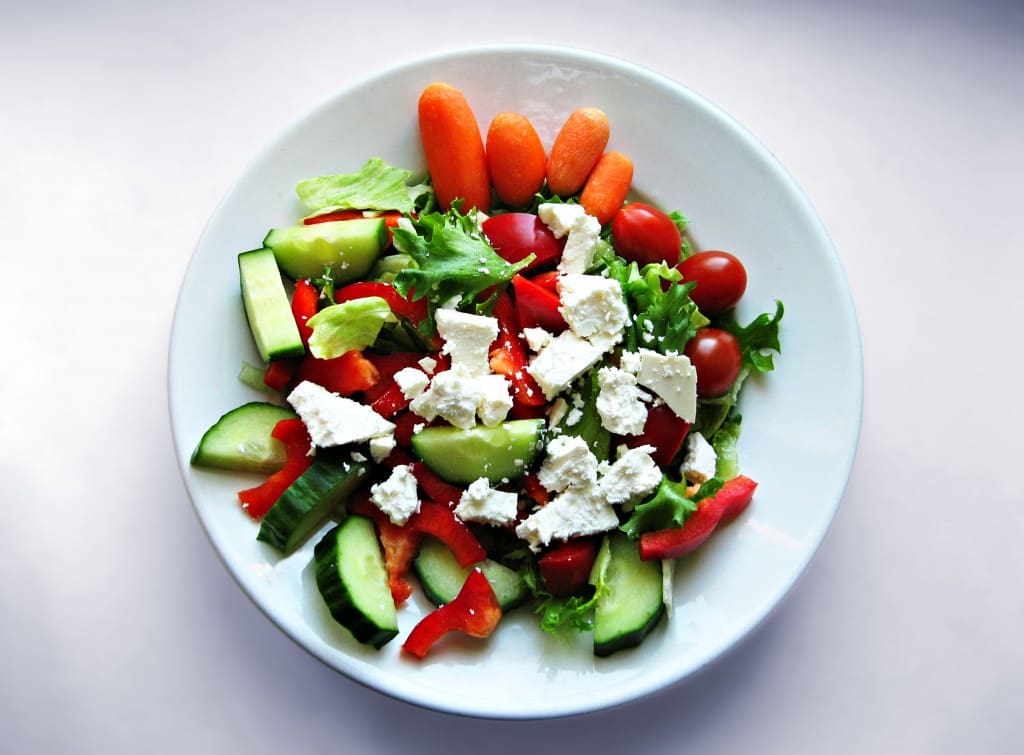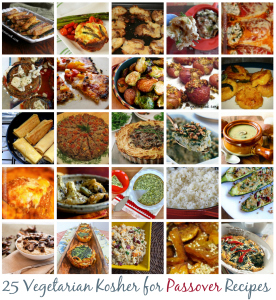Today’s guest post comes from KOAB reader Becky Goldberg. Like many of us, Becky used to dread Passover food… until she learned to eat like the Israelis.
I used to hate Passover. There, I said it.
It was, without a doubt, the time of year I dreaded most.
I had tried recreating wonderful childhood memories of unpacking dishes wrapped in last year’s newspapers, creating a springtime “leaf pile” in the kitchen. I had tried ignoring the holiday altogether and farming myself out to anyone who would have me. I had tried embracing the restrictions, seeking out inspiration from structure.
But for all my efforts and earnest attempts, the best Passover had ever been in my adult life was tolerable. That is, until my honeymoon.
I met Zev in June, knew I’d marry him by November, and did so the following October. For our honeymoon, we decided to go where our hearts lie, Eretz Yisrael, and it just made sense to take the opportunity to go over Passover. Little did I know that this would be the model for how I’d make Passover forevermore.
My experience with the Israeli diet is that the emphasis is on fresh, wholesome foods, but never so much as over Passover. Every morning, we availed ourselves of omelet stations where sautéed vegetables took the place of muffins and bagels, yogurt parfait with berries tossed in sugar which replaced cereal and milk, and shakshuka (poached eggs in a spicy tomato sauce) served alongside sliced seedless cucumbers which replaced mounds of pancakes and waffles.
Lunch brought dozens of fresh salads, poached salmon and cottage cheese, and dinner delivered a new array, adding grilled meats, carving stations, and some of the most amazing produce I’ve ever tasted. At dessert, ice cream sundae bars replete with berries, baked apples and chocolates unabashedly took the place of cookies and brownies.
I finally realized that, if the best you can say about something is, “It doesn’t taste like a Passover cake,” it wasn’t worth eating. I swore I’d never buy another baked good manipulated for Passover again.
The first year after our honeymoon was the $17-vinegar year. I remembered the delectable salad selection, and vowed I’d recreate it at all cost; Alas, cost was all I experienced. The second year I learned that even vinegar can go bad if kept in a slightly-warm storage space for 12 months.
The third and fourth year I tolerated the holiday, resigning myself that there are worse things than to hate my mother’s favorite time of year. The fifth year, having added two beautiful baby boys still under 2 years old, I demanded we go to another resort.
The sixth year, I finally got it right. I bought produce, meat, chicken and fresh fish, basic mayonnaise and a $1.50 bottle of plain, white vinegar. I culled every produce-only recipe I could find, bought a good cutting board and two good knives, and set about making enough food to feed four people for one week.
And a remarkable thing happened… I enjoyed Passover. I didn’t stress about spending $5 on boxes of cereal that nobody would enjoy anyways. I didn’t qualify matzo-kugel side dishes as, ‘not as good as lokshen, but it’s Passover after all.’ And I didn’t have to buy prunes or compote.
I concentrated on making sure there was every color of the rainbow on dessert fruit platters, dotted with chocolates and the occasional homemade sorbet. I poached salmon and shredded cucumber for beautifully-presented appetizers. I put more salads on my table than were there in the height of CSA-season.
And when I reviewed my bottom line, I found the best Passover miracle: Released from the burden of making the same foods we eat year round, I also released hundreds of dollars. Yes, hundreds. For every $5 box of potato-starch cake I didn’t buy, I could buy 2lbs of strawberries. Trading in two $7 cans of Pesadic canned salmon meant steaks for dinner. And losing the $17 bottle of vinegar more than paid for our milk and cheese for the week.
I’d saved enough to invest in a Pesadic crock pot, and even made chollent. Focusing on fresh, whole foods saved money for my family, and saved Passover for me. I’m ‘sold.’
Here are two of my favorite recipes that have me loving Pesach now.
Passover Sorbet c/o easyjewishrecipes.com
- 1 ½ cups sugar
- 1 cup water
- 3 egg whites, beaten until stiff
- 2 cups orange juice
- 3 tsp. lemon juice (roughly juice from ½ a lemon)
Boil sugar and water for five minutes – a light syrup will form. Once the syrup has cooled, beat it in at low speed to the beaten egg whites. Continue to beat on low for a few moments as you add the orange and lemon juices. Pour mixture into pan or bowl for chilling in the freezer. When the mixture becomes firm but not completely frozen, remove it and re-beat it again, lightly. Re-freeze in serving dish or parfait glasses that you plan to use. You can also leave the sorbet in the freezer, well-covered, to be used at a later time.
Serves 4.
Passover chollent
c/o Zev Goldberg
- chollent meat
- quinoa
- matzo balls (homemade or jarred, yes- steal them from leftover Seder night soup)
- potatoes (skin on, if you use fresh); sweet potatoes if you like a sweet chollent
- onion, quartered
- kishke
- soup mix and/or dried seasonings, whatever you get
Add meat to bottom of crock pot, then add the remaining ingredients. Add seasonings & kishke last (as the chollent cooks, the flavor of the kishke will seep throughout. Fill with water to cover by about ½ inch. Cook on low until lunchtime.
Becky Goldberg lives in Chicago with her husband and two sons. As an avid Kosher on a Budget reader, Becky has set a goal of spending no more than $350 on Pesach this year. To see how she’s doing, read her accounting of items & money spent and this helpful Passover resources post.

















What a great article. This is the approach my family makes. It just seemed like common sense, but maybe it’s only common sense because my husband is Israeli. Why eat foods you normally don’t eat anyway. I make a delicious torte during Pesach from the Joan Nathan Holiday Cookbook. It is actually in the Shabbat section. If I made “passover cake mix” into the house, my husband would never eat it. That’s the joy of being married to picky Israelis. If it’s not tasty, it’s not worth eating.
Great post (and reason 754,694 to make Aliya 🙂
—
Daniela
http://isreview1.blogspot.com
Awesome post, Becky!!
Thanks Becky for reminding me why I made Aliyah and why I love Pesach. Another reason to love the Israeli diet over pesach-less time in the kitchen more time with the family tiyuling the country. Any chance we can get you guys to join us for Pesach, or any other time, here soon?
Eating healthy (and having a gluten sensitivity), I find that we eat very similarly over Passover as we do the rest of the year (minus the Challah of course). Year round, I scramble up eggs for breakfast and serve with fresh tomatoes and cucumbers, influnces from my husband who is Israeli. Sometimes I add a dollop of yogurt or if time allows I pan fry a few potatoes. Lo and behold, all of this can be for Passover too.
I could not agree more. If it does not taste good then why bother! Why bog your diet down with a lot of heavy matzah to make a knock-off casserole or lasgana? Why pay an exuberant price for “frankenfood” from a box. Passover is a time to be free. We should not feel obligated to the “Kosher for Passover’ aisle in the grocery store. I much prefer to wander over to the produce section and splurge on tasty, wholesome fruits and vegetables. Though I must admit, I do like a good matzah brie with melted butter and jams (which I plan to make myself)!
about recipes—
1] some dont eat quinoa on pesach
2] use of raw egg whites not safe for [at least ] children….
I know that it is way past Passover, but I just finished reading this article ( laughed really hard) and could not help responding.
“I used to hate Passover. There, I said it.” ( It does make one feel guilty to say it)
I totally understand. I also used to hate Passover for the very same reasons. First of all it cost a fortune for all the ” Pasachdica” food. Second , none of the packaged food is healthy, and I would never eat it during the year, and third it doesn’t even taste good.
I too had finally resigned that our Passover meals are made of real whole unprocessed food that of course all kosher for Passover.
We do eat quinoa ( because it is actually a berry) and are Sephardic so we also eat rice.
Great Great post..